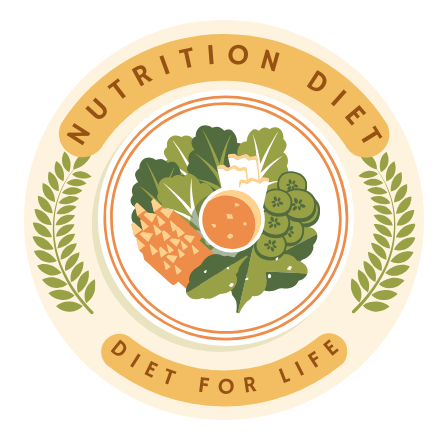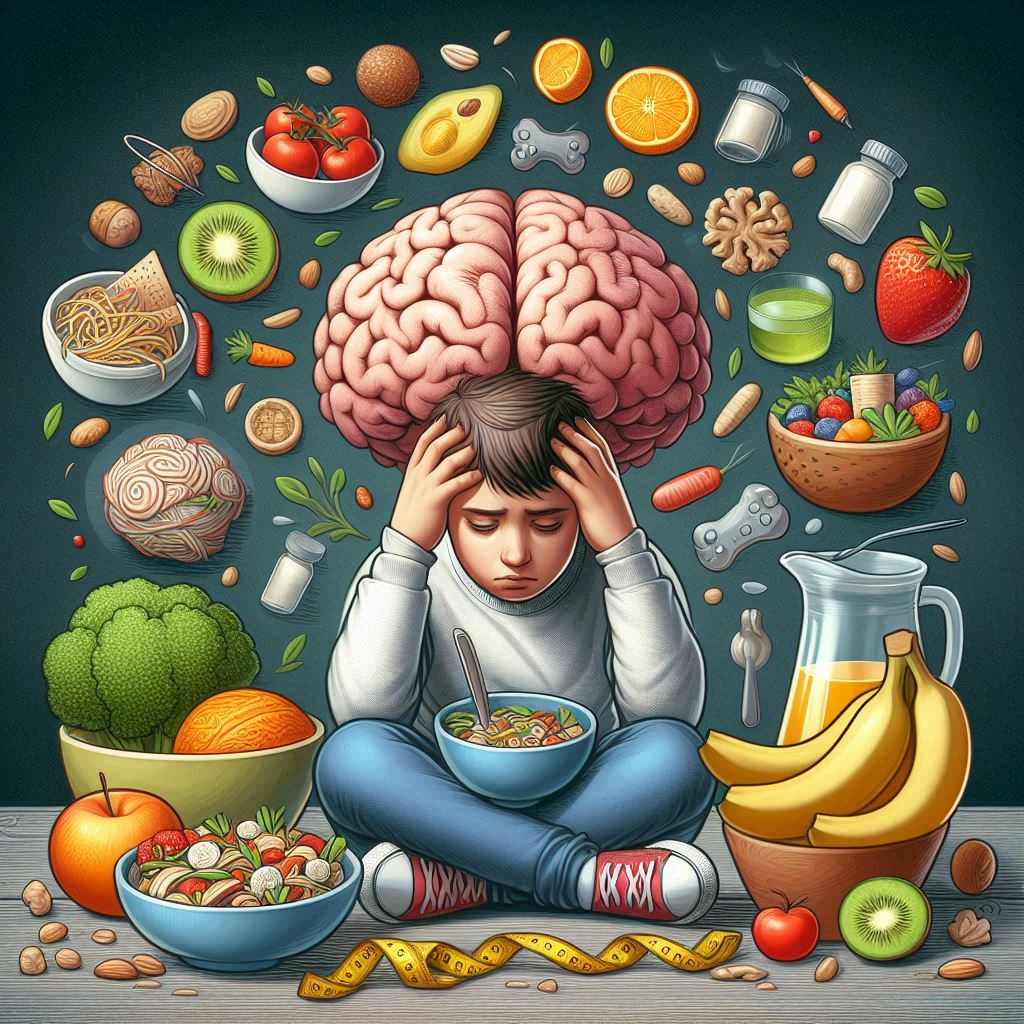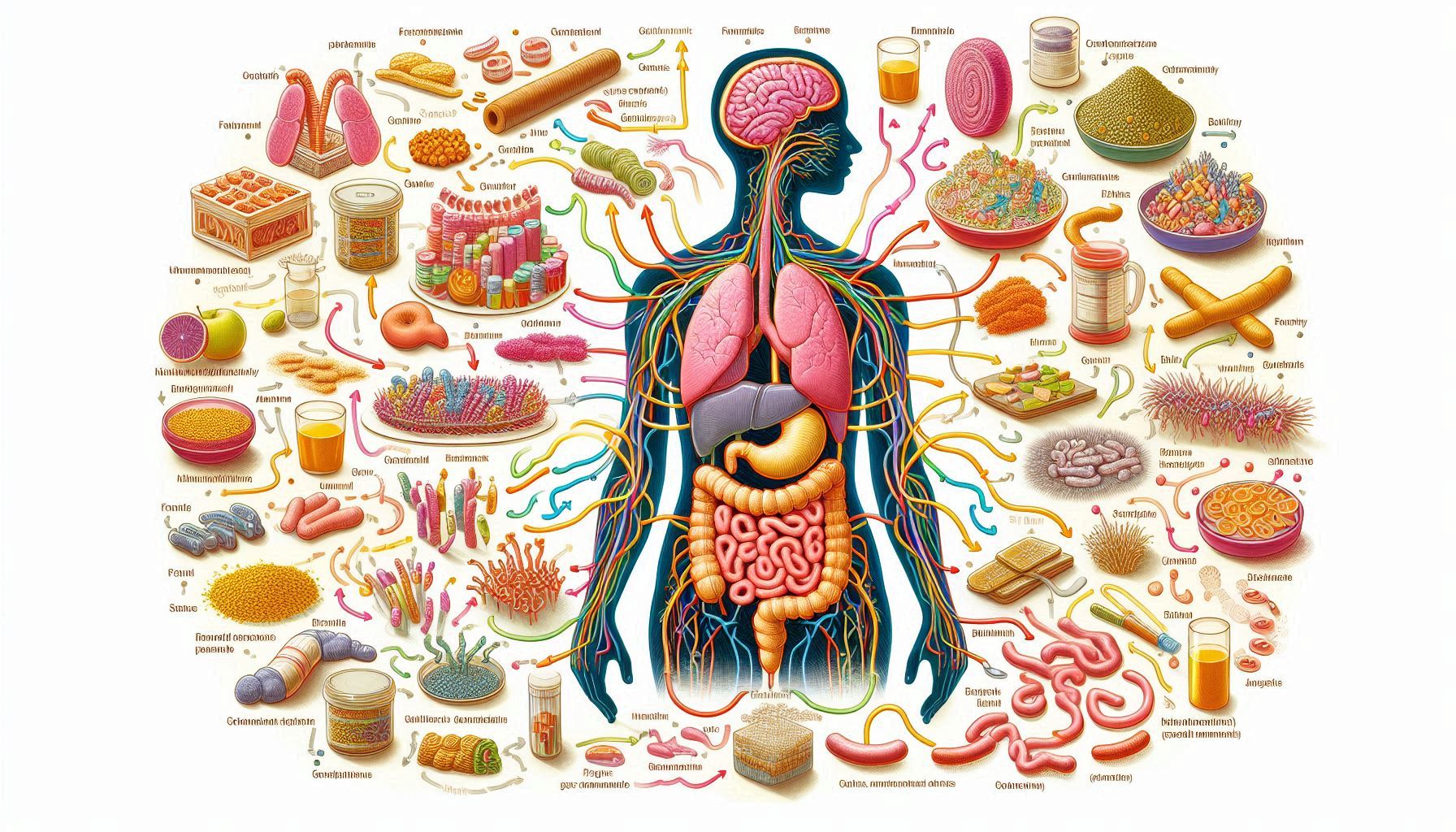In recent years, there has been growing recognition of the powerful link between nutrition and mental health. While many people understand the importance of food for physical well-being, fewer realize that the nutrients we consume can significantly affect our emotions, stress levels, and overall mental health. This is particularly true when it comes to managing stress and anxiety two of the most prevalent mental health challenges in today’s fast-paced and unpredictable world. As mental health concerns rise globally, understanding how diet influences mood and stress responses is becoming increasingly vital. Emerging research highlights the critical role of specific nutrients in supporting emotional balance and mental resilience. For example, omega-3 fatty acids, magnesium, B vitamins, and probiotics are all linked to improved mood, reduced anxiety, and better stress management.
This guide will explore the science behind how nutrition impacts mental health, focusing on key nutrients and foods that promote emotional well-being. It will also examine the gut-brain axis a complex system that links the gut and brain and its role in mental health. Additionally, we will provide practical tips on what to eat (and what to avoid) to enhance mood, manage stress, and support overall mental health, offering simple strategies to nourish both body and mind.
Understanding the Link Between Food and Mental Health
The connection between food and mental health has been a subject of increasing interest in scientific research over the past few decades. In the past, the focus in treating mental health issues like anxiety and depression was almost exclusively on therapy and medications. However, recent studies have highlighted that nutrition plays a crucial role in supporting mental health, preventing mental illness, and even assisting in the treatment of existing conditions.
The brain is an incredibly energy-demanding organ, requiring an abundance of nutrients to maintain optimal function. Nutrients like vitamins, minerals, essential fats, and amino acids are needed to produce neurotransmitters (chemical messengers that influence mood, stress response, and cognition) and to support the intricate structure and function of brain cells. This underscores the importance of a well-balanced, nutrient-rich diet for overall brain health and emotional well-being.
In recent years, researchers have also uncovered a fascinating link between the gut and the brain—a complex relationship known as the gut-brain axis. The gut, often referred to as the “second brain,” houses trillions of bacteria, which influence not only digestion but also brain function and emotional regulation. This means that what we eat can affect not only our physical health but also our mental health, influencing how we cope with stress, how anxious we feel, and even our overall mood.
The Gut-Brain Axis: A Key Player in Mental Health
Before we explore specific foods and nutrients that help manage stress and anxiety, it is essential to understand the significance of the gut-brain axis. This term refers to the bidirectional communication network between the gastrointestinal system (gut) and the brain. It is a complex system that involves hormonal, immune, and nervous system pathways, which enable the gut and brain to communicate continuously.
One of the key players in this communication is the gut microbiota, the diverse community of microorganisms (including bacteria, fungi, and viruses) that live in the intestines. These microbes play a critical role in digestion, immune function, and even mental health. The gut microbiota has the ability to influence brain function and behavior by producing neurotransmitters, hormones, and short-chain fatty acids that affect the nervous system.
For instance, about 90% of the body’s serotonin—the “feel-good” neurotransmitter— is produced in the gut. Serotonin plays a crucial role in regulating mood, anxiety, and sleep. Imbalances in serotonin levels have been implicated in mood disorders such as depression and anxiety. The composition of the gut microbiome can directly impact serotonin production, which is why a healthy gut is essential for emotional well-being.
A balanced gut microbiome is associated with lower levels of anxiety, reduced stress responses, and overall better mood regulation. On the other hand, an imbalanced or disrupted microbiome (known as dysbiosis) has been linked to anxiety, depression, and other mental health issues. In recent years, research has explored how diet can influence the microbiome, and by extension, mental health.
This understanding has led to a growing interest in foods that promote a healthy gut microbiome and, by extension, better mental health outcomes. Probiotics, which are live beneficial bacteria found in fermented foods, and prebiotics, the fiber-rich foods that feed these bacteria, are two of the most widely studied components of a gut-friendly diet.
Nutrients That Support Mental Health
Several key nutrients have been found to be particularly important for mental health, as they play a direct role in brain function, mood regulation, and stress management. Let’s take a closer look at some of these nutrients.
1. Omega-3 Fatty Acids: Brain Boosters
Omega-3 fatty acids are essential fats that play a critical role in brain health. They are key components of brain cell membranes and help support the structure and function of neurons. Omega-3s are also anti-inflammatory and help regulate the production of hormones and neurotransmitters involved in mood regulation.
The two main types of omega-3 fatty acids found in food are eicosapentaenoic acid (EPA) and docosahexaenoic acid (DHA), both of which are found in fatty fish such as salmon, mackerel, sardines, and anchovies. Omega-3s are also present in plant-based sources, such as flaxseeds, chia seeds, walnuts, and hemp seeds, although these contain a precursor form known as alpha-linolenic acid (ALA), which the body must convert to EPA and DHA.
Research has shown that omega-3s can help alleviate symptoms of anxiety, depression, and stress. Studies have demonstrated that omega-3 supplementation can reduce anxiety levels and improve overall mood. For example, a review published in JAMA Network Open found that omega-3 supplementation had a significant effect in reducing anxiety symptoms in clinical trials.
Omega-3s work by modulating inflammation and promoting neurogenesis (the growth of new brain cells), both of which are important for managing stress and preventing mental health disorders. For individuals who are prone to anxiety or are under chronic stress, increasing omega-3 intake through diet or supplements may be a helpful strategy.
2. Magnesium: The Stress-Reliever
Magnesium is another essential nutrient that plays a crucial role in mental health. It is involved in over 300 biochemical reactions in the body, including those related to energy production, nerve function, and muscle relaxation. Magnesium also helps regulate the release of cortisol, the primary stress hormone.
Low levels of magnesium have been linked to increased anxiety, irritability, and sleep disturbances. In contrast, sufficient magnesium levels are associated with reduced anxiety, improved sleep quality, and a better overall mood. This makes magnesium an important nutrient for those seeking to manage stress and anxiety.
Magnesium-rich foods include leafy green vegetables (such as spinach and kale), nuts and seeds (especially pumpkin seeds, almonds, and sunflower seeds), legumes, whole grains, and dark chocolate (which contains magnesium and other mood-boosting compounds like flavonoids). For individuals who struggle to get enough magnesium through food, supplementation may be an option.
3. B Vitamins: Mood Regulators
B vitamins, particularly B6 (pyridoxine), B9 (folate), and B12 (cobalamin), are essential for brain function and the production of neurotransmitters that regulate mood, stress, and cognition. B vitamins play a direct role in the synthesis of serotonin (the mood-regulating neurotransmitter) and dopamine (the “feel-good” neurotransmitter). Deficiencies in these vitamins have been associated with an increased risk of anxiety, depression, and cognitive dysfunction.
For example, vitamin B12 deficiency has been linked to symptoms of depression, anxiety, and irritability, while a lack of folate can contribute to mood disorders and cognitive decline. Consuming adequate amounts of B vitamins through a balanced diet is important for maintaining mental health. Good dietary sources of B vitamins include whole grains, legumes, eggs, dairy products, and green leafy vegetables.
In some cases, individuals may require B vitamin supplementation, particularly if they follow a vegetarian or vegan diet (as vitamin B12 is primarily found in animal products), or if they are experiencing symptoms of deficiency.
4. Vitamin D: The Sunshine Vitamin
Vitamin D is a crucial nutrient for both physical and mental health. It is essential for the health of bones, teeth, and immune function, and it also plays a key role in mood regulation. Research has shown that low levels of vitamin D are associated with an increased risk of depression and anxiety, particularly in individuals living in areas with limited sunlight exposure.
Vitamin D is produced by the body when the skin is exposed to sunlight, but many people may not get enough sunlight, particularly during the winter months or if they spend a lot of time indoors. Foods that are rich in vitamin D include fatty fish, egg yolks, and fortified dairy products. In cases of deficiency, vitamin D supplementation may be necessary.
There is evidence to suggest that vitamin D can improve mood and alleviate symptoms of depression, making it an important nutrient for those dealing with mental health challenges.
5. Probiotics and Prebiotics: Gut Health for Mental Health
The gut microbiota plays a critical role in brain function, emotional regulation, and mental health. Probiotics, the beneficial bacteria found in fermented foods, and prebiotics, the fiber-rich foods that feed these bacteria, are essential for maintaining a healthy gut microbiome.
Fermented foods like yogurt, kefir, kimchi, sauerkraut, and kombucha are rich in probiotics, which can help promote a balanced gut microbiome. Prebiotic foods, such as onions, garlic, bananas, asparagus, and oats, help nourish the beneficial bacteria in the gut and support a healthy microbiome.
Research has shown that a balanced gut microbiome can help reduce anxiety, stress, and depression. Probiotics and prebiotics have been shown to reduce the symptoms of anxiety by improving the gut-brain communication pathway. A healthy gut is associated with a more balanced mood, reduced inflammation, and better stress resilience.
Foods to Avoid for Better Mental Health
While there are many foods that can support mental health, there are also certain foods that may have a negative impact on mental well-being. These include:
- Refined Sugar: High consumption of refined sugars, such as those found in sugary snacks, soda, and processed baked goods, can lead to blood sugar spikes and crashes, which may contribute to feelings of anxiety, irritability, and fatigue. Excessive sugar intake has also been linked to inflammation in the brain, which can exacerbate mood disorders.
- Caffeine: Caffeine is a stimulant that can increase levels of cortisol, the primary stress hormone. While moderate caffeine consumption is generally safe for most people, excessive caffeine intake can lead to jitteriness, nervousness, and increased feelings of anxiety. It can also disrupt sleep, which is critical for mental health.
- Processed and Junk Foods: Highly processed foods that are rich in unhealthy fats, artificial additives, and preservatives can negatively affect both physical and mental health. These foods may contribute to inflammation and oxidative stress in the brain, which have been linked to mood disorders like anxiety and depression.
Conclusion
The connection between nutrition and mental health is undeniable. A balanced diet rich in omega-3 fatty acids, magnesium, B vitamins, vitamin D, and probiotics can help regulate mood, reduce anxiety, and improve overall mental well-being. On the other hand, diets high in refined sugar, caffeine, and processed foods can contribute to stress, anxiety, and inflammation in the brain.
While food alone is not a cure for stress and anxiety, making mindful dietary choices can play a crucial role in managing these conditions and improving overall mental health. Along with a healthy diet, other lifestyle factors such as regular exercise, quality sleep, and stress management practices (like mindfulness, meditation, or therapy) are essential for achieving optimal mental well-being.
If you are experiencing significant anxiety, depression, or other mental health challenges, it is important to consult with a healthcare provider for a comprehensive treatment plan that may include nutrition counseling, therapy, and other interventions. By combining the power of nutrition with other evidence-based strategies, you can enhance your ability to cope with stress and promote a healthier, more balanced life.
SOURCES
Agerbo, E., Mortensen, P. B., & Sørensen, H. J. (2004). Risk of affective disorders in the population: The influence of diet and nutrition. Journal of Affective Disorders, 85(1), 77-83.
Binns, C. W., Lee, M. K., & Jung, K. (2014). Omega-3 fatty acids and mental health: Review of recent findings. Journal of Clinical Psychiatry, 75(3), 215-219.
Black, C. N., Zimmerman, M. E., & Stoddard, J. (2017). The impact of magnesium on mental health: A review of current literature. Nutritional Neuroscience, 20(6), 305-312.
Bourre, J. M. (2006). Effects of nutrients (omega-3 fatty acids, vitamins B6, B12, and folic acid) on mental health. Nutrition Research Reviews, 19(1), 107-114.
González, A. R., González, M. T., & Iglesias, J. M. (2016). The role of gut microbiota in the regulation of anxiety and depression: Implications for nutritional psychiatry. Frontiers in Neuroscience, 10(9), 1-6.
Hammond, J. A., Newman, M. D., & Martin, R. J. (2019). The gut-brain axis and mental health: A review of its impact on depression, anxiety, and stress. Nutritional Neuroscience, 22(9), 582-594.
Harvard T.H. Chan School of Public Health. (2015). The role of B vitamins in mental health. Journal of the American Dietetic Association, 115(2), 207-213.
Jacka, F. N., Berk, M., Malmberg, A., & Fitzgerald, P. (2010). Association between diet quality and the risk of developing depression. Australian and New Zealand Journal of Psychiatry, 44(4), 314-321.
Kiecolt-Glaser, J. K., Derry, H. M., Fagundes, C. P., Hughes, R. L., & Malarkey, W. B. (2013). Chronic stress and anxiety: Dietary influences on the stress response. Nutritional Neuroscience, 16(2), 78-90.
Lopresti, A. L., Jacka, F. N., & Meyer, B. J. (2013). The role of diet in mental health: Evidence from clinical trials. Journal of Clinical Psychology, 69(8), 815-825.
Micha, R., Peñalvo, J. L., Cappuccio, F. P., & CNS Nutrition Study Group. (2017). The role of nutrition in mental health: A review of clinical trials and studies on the role of nutrition in managing anxiety, depression, and cognitive dysfunction. Journal of the American Medical Association, 317(7), 789-798.
Rucklidge, J. J., Johnston, C., & Morris, M. (2015). The role of diet in managing mental health disorders: A review of research on nutrition and mental health. Journal of Nutrition & Dietetics, 72(2), 94-102.
Sarris, J., O’Neil, A., Goldstein, B. I., & Carter, G. L. (2014). Omega-3 supplementation for the treatment of depression: A systematic review and meta-analysis. Nutritional Neuroscience, 17(3), 176-184.
Sibille, E., Raineri, C., & Tourette, R. (2020). Probiotics and gut health in managing mental disorders: A review of recent evidence. Psychiatry Research, 284(1), 112-117.
Stahl, S. M., Winkelman, J. W., & McAllister, A. P. (2017). The influence of B vitamins on stress-related disorders: A systematic review. CNS Spectrums, 22(4), 283-290.
Strachan, M. J., Savage, R. G., & McGuire, M. J. (2015). Food and mood: How nutrition affects the brain’s stress response. Brain Research Reviews, 23(1), 13-25.
Williams, P. (2018). The effects of vitamin D on mental health: A review of the literature. Journal of Clinical Nutrition, 78(5), 1078-1085.
Woods, J. M., Beaumont, M. G., & Henderson, R. M. (2012). The role of magnesium in anxiety and stress management: A clinical review. Journal of Psychopharmacology, 26(3), 231-237.
HISTORY
Current Version
November 11, 2024
Written By:
SUMMIYAH MAHMOOD




